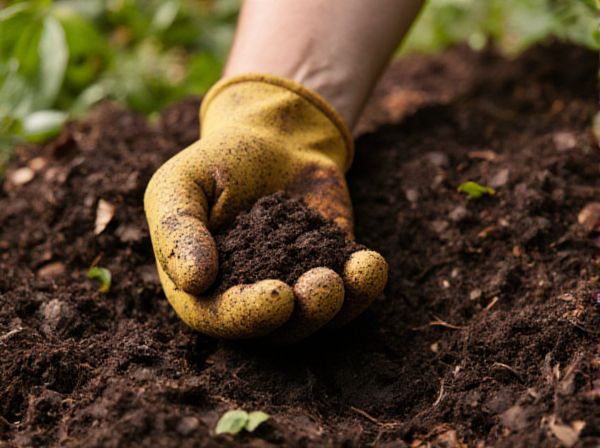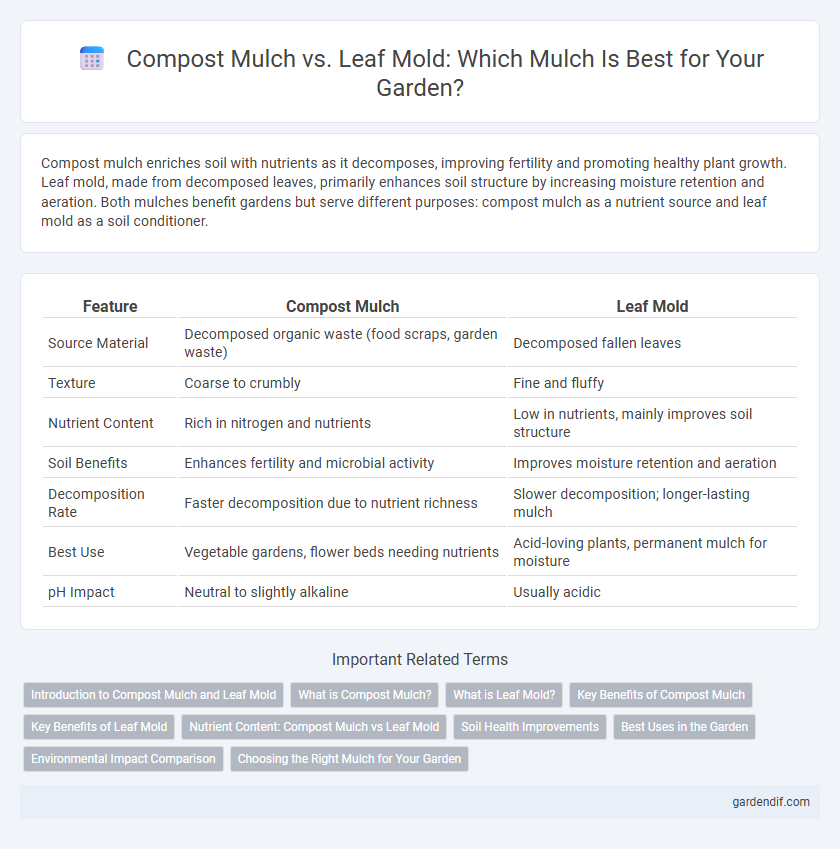
Compost mulch vs leaf mold Illustration
Compost mulch enriches soil with nutrients as it decomposes, improving fertility and promoting healthy plant growth. Leaf mold, made from decomposed leaves, primarily enhances soil structure by increasing moisture retention and aeration. Both mulches benefit gardens but serve different purposes: compost mulch as a nutrient source and leaf mold as a soil conditioner.
Table of Comparison
| Feature | Compost Mulch | Leaf Mold |
|---|---|---|
| Source Material | Decomposed organic waste (food scraps, garden waste) | Decomposed fallen leaves |
| Texture | Coarse to crumbly | Fine and fluffy |
| Nutrient Content | Rich in nitrogen and nutrients | Low in nutrients, mainly improves soil structure |
| Soil Benefits | Enhances fertility and microbial activity | Improves moisture retention and aeration |
| Decomposition Rate | Faster decomposition due to nutrient richness | Slower decomposition; longer-lasting mulch |
| Best Use | Vegetable gardens, flower beds needing nutrients | Acid-loving plants, permanent mulch for moisture |
| pH Impact | Neutral to slightly alkaline | Usually acidic |
Introduction to Compost Mulch and Leaf Mold
Compost mulch consists of decomposed organic matter rich in nutrients that improve soil fertility and structure, enhancing plant growth and moisture retention. Leaf mold is formed from partially decomposed leaves, offering excellent soil conditioning properties by increasing water-holding capacity and promoting beneficial microbial activity. Both compost mulch and leaf mold serve as sustainable soil amendments but differ in nutrient content and decomposition stage, influencing their specific uses in gardening and agriculture.
What is Compost Mulch?
Compost mulch is decomposed organic matter that enriches soil fertility by improving its structure, moisture retention, and nutrient content. Unlike leaf mold, which primarily consists of partially decomposed leaves providing excellent water retention, compost mulch contains a balanced mix of kitchen scraps, garden waste, and other organic materials that accelerate nutrient cycling. This type of mulch promotes healthy plant growth by supplying essential nutrients and enhancing microbial activity in the soil.
What is Leaf Mold?
Leaf mold is a sustainable mulch made from decomposed leaves, rich in beneficial fungi that improve soil structure and moisture retention. Unlike compost mulch, which is nutrient-dense and decomposes rapidly, leaf mold provides a slow-release source of organic matter and enhances soil aeration. Its crumbly texture promotes healthy root growth and supports microbial biodiversity in garden soils.
Key Benefits of Compost Mulch
Compost mulch enhances soil fertility by providing essential nutrients and improving microbial activity, leading to healthier plant growth. It increases moisture retention and helps regulate soil temperature, reducing water use and protecting roots from extreme conditions. Unlike leaf mold, compost mulch decomposes faster, enriching soil structure and promoting nutrient cycling more effectively.
Key Benefits of Leaf Mold
Leaf mold excels in improving soil structure by enhancing moisture retention and aeration, fostering healthier root development. Its slow decomposition process releases nutrients gradually, promoting long-term soil fertility without the risk of nitrogen depletion common in some compost mulches. Rich in beneficial microorganisms, leaf mold supports a vibrant soil ecosystem that boosts plant resilience and growth.
Nutrient Content: Compost Mulch vs Leaf Mold
Compost mulch typically offers higher nutrient content due to its rich organic matter derived from decomposed kitchen scraps, garden waste, and manure, supplying essential nitrogen, phosphorus, and potassium for plant growth. Leaf mold, formed from decomposed leaves, provides lower nutrient levels but excels in improving soil structure and moisture retention. Both materials enhance soil health, yet compost mulch delivers more immediate nutrient availability compared to the slower nutrient release from leaf mold.
Soil Health Improvements
Compost mulch enriches soil with essential nutrients and beneficial microorganisms, accelerating nutrient cycling and improving soil structure. Leaf mold primarily enhances soil moisture retention and increases microbial diversity, promoting long-term soil fertility without rapidly altering nutrient levels. Both materials support soil health by fostering a robust, biologically active environment crucial for plant growth and resilience.
Best Uses in the Garden
Compost mulch enriches garden soil by adding essential nutrients and improving moisture retention, making it ideal for vegetable beds and flower gardens needing fertility boost. Leaf mold excels in enhancing soil structure and water-holding capacity, perfect for shrubs, trees, and perennial plantings that benefit from long-term soil conditioning. Both mulches contribute to organic matter, but choosing compost or leaf mold depends on specific garden needs such as nutrient supply or soil texture improvement.
Environmental Impact Comparison
Compost mulch enhances soil structure and fertility by recycling organic waste, reducing landfill contributions and greenhouse gas emissions compared to synthetic alternatives. Leaf mold primarily improves soil water retention and biodiversity, promoting natural decomposition processes without requiring additional inputs. Both methods support sustainable gardening, yet compost mulch offers greater carbon sequestration benefits while leaf mold excels in fostering soil microbial activity.
Choosing the Right Mulch for Your Garden
Compost mulch improves soil fertility by adding essential nutrients and enhancing microbial activity, while leaf mold excels in moisture retention and soil structure improvement through its high organic matter content. Choosing the right mulch depends on your garden's specific needs: use compost mulch to boost nutrient levels and support plant growth, or opt for leaf mold to maintain consistent soil moisture and promote aeration. Combining both can create a balanced environment, benefiting overall soil health and plant development.
Compost mulch vs leaf mold Infographic

 gardendif.com
gardendif.com